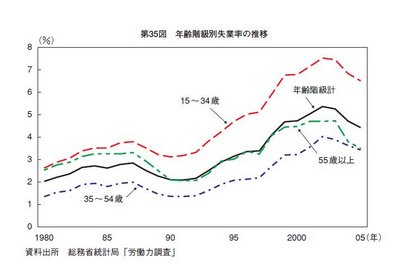Contrary to its reactionary image, the Sankei Shimbun published an editorial on Thursday that swims against the tide of panic over a statisticaly significant increase in income diversity among younger Japanese in the 1990's and early 2000's.
「冷静な視点に立ち対策を」(sorry, no link) or "Let's choose our countermeasures from a sober point of view" acknowledges the results in
# the Ministry of Finance's Annual Report on the Japanese Economy and Public Finance 2006 , (English version here),
# the Ministry of Health and Labor's White Paper on the Labor Economy (a shorter summary report here)
# and the OECD's recent Economic Survey of Japan
and still has the gumption to say, "Yes, but...I don't really like your data sets." *
The editorial notes that in recent years, as the economy has expanded, the number of available jobs has increased, the number of "freeters" has shrunk and fraction of new employees being hired as permanent employees (正社員) has jumped.
As a result of these trends, the editors caution against the initiation of wasteful and unnecessary government programs.
They do leave one door open in terms of areas where government can help--in the prevention of a hardening of socio-economic differences.
Research in the U.S. has found that entering the workforce during a recession or at the time of a market will have a significant permanent effect on an individual's earnings and advancement:
"The Short- and Long-Term Career Effects of Graduating in a Recession" (National Bureau of Economic Research Working Paper 12159, April 2006.
"The Making of an Investment Banker: Macroeconomic Shocks, Career Choice and Lifetime Income" (National Bureau of Economic Research Working Paper 12059, February 2006
Having an entire seething generation stuck in the slow lane for the crime of being born at the wrong time seems like something the Japanese government should tackle, if it wants to A) be popular and B) maximize the output of its citizenry.
The trick will be, of course, in targeting the help to the age cohort that needs it.
One reasonable way would be to offer grants to young adults who wish to return to tertiary education or who wish to take graduate-level courses in the hopes of improving their job prospects.
But anyway, bravo to the Sankei Shimbun for bucking the tide-even if it is in language conspicuously similar what are ostensibly the words of Abe Shinzō.
* Oh! If there were only some way to illustrate relatively paucity of demand for labor in 2002 that might have made it difficult for employees to bid up wages and demand permanent positions!
How about page 26 of the Ministry of Health and Labor's summary report)?

Uh, gee. It looks like unemployment for all age cohorts topped out in 2002, with the youngest cohort (ages 15-34) seeing an unemployment rate of over 7%.

No comments:
Post a Comment